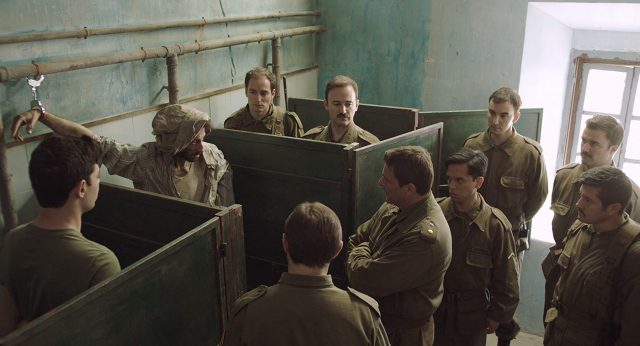A Twelve-Year Night: One Day at a Time, by David Bax

Only a few minutes into Álvaro Brechner’s A Twelve-Year Night, prisoners have gasoline soaked bags put over their heads and are told to stand in a small room as close to the wall as possible without touching it for hours on end, the implication being that the punishment for failing is to be lit on fire. It’s a harrowing depiction of physical and mental torture. But the movie never reaches that level of danger again. Brechner is too concerned with the comfort of his audience to let them get too close to the pain of his characters. Still, he does achieve some bold, if dryly executed, revelations about sanity and democracy.
In 1973, nine Tupamaros (members of a left-wing guerilla movement) were arrested by Uruguay’s recently installed military dictatorship. A Twelve-Year Night is the story of three of them–José Mujica (Antonio de la Torre), Mauricio Rosencof (Chino Darín) and Eleuterio Fernández Huidobro (Alfonso Tort)–who remained in squalid, almost entirely solitary confinement until the reestablishment of democracy in Uruguay in 1985.
This is recent history, then, but Brechner, who also wrote the screenplay, over-explains it to us like we’re uncomprehending children. When a group of men in uniforms come to interrogate the prisoners, just in case you wondered for a second who they might be, one of them immediately states, “We’re the national army.” It’s hard to imagine anyone present in that situation at that time wouldn’t have known that. The spoonfeeding extends beyond the sociopolitical circumstances as well. When the guards are soaking those bags in gasoline, one of them urgently says to the other, “Soak it in gasoline!” Presumably, this is because Brechner wasn’t sure we’d understand what the liquid in question was but it’s a bit like standing over a chef’s shoulder as they add garlic to a dish and shouting, “Add the garlic!”
Some of A Twelve-Year Night‘s strongest moments, though, come when it’s actually funny on purpose. A ridiculous sequence in which the complications involved in letting a prisoner use the toilet extend further and further up the military hierarchy is a brief, darkly hilarious satire of dictatorship. Every person in the chain could have easily solved the problem but they’re all too scared of what will happen to them if they make a decision for themselves.
Every time the captives finally learn what the preposterous rules are, they are moved to another prison and have to start all over again. In this, though, Brechner sees not comedy but a way to illustrate the necessity of remaining occupied for a human mind to function. The instability actually seems to benefit these men as it keeps them thinking and learning. The alternative is insanity, which threatens to overtake Mujica, who is kept further away from the other two. Brechner’s realization of Mujica’s mental deterioration, however, is the hackneyed stuff of primetime television dramas and mid-budget studio fare, all quick, flashing images and sharp, electronic bursts on the soundtrack.
In its final (and arguably most compelling) act, A Twelve-Year Night slightly changes its thematic course. In snatches of overheard news broadcasts and conversations among guards, Mujica, Rosencof and Huidobro begin to understand that the country is changing. At first, they don’t know if it’s for better or worse but soon they begin to experience a relaxation of the inhumanity that has dictated their lives for a dozen years. They get more exercise, more time outside. They even get to see one another. Eventually, they will be released and go on to live remarkable lives. Mujica served as Uruguay’s president from 2010-2015 and Huidobro was his Minister of Defense while Rosencof remains a successful poet and playwright to this day. This doesn’t happen all at once, of course, just like the military dictatorship only came into place after five years of gradually eroding civil liberties. But, bit by bit, A Twelve-Year Night serves its clearest purpose by illustrating how democracy and changes in policy slowly trickle down to effect everyone.




























